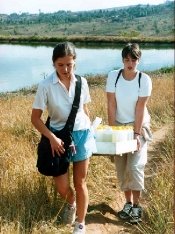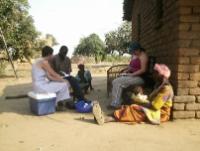Civil & Environmental Engineering
Public Health
Research in environmental health develops the interface between environmental engineering and public health. Common themes include:
- the application of monitoring and modelling sciences to research questions in environmental epidemiology
- exposure assessment/characterisation
- risk-based assessment of environmental influences on health
Our research activities include microbiological and chemical contamination of the environment around us, including water, air, and foodstuffs.
Our current research
Human disease cause by the free-living amoeba, Acanthamoeba, and the association this organism has with contact lens wear
Contamination of contact lenses with the organism occurs mainly due to poor lens hygiene on behalf of the wearer. For example, rinsing lenses in tap, where the organism is commonly found, or using inefficient lens disinfection systems. Once contaminated, the lens acts as a mechanical vector transferring the organism onto the eye surface where subsequent infection can occur.
We’ve investigated adhesion of the organism to different lens materials, specifically:
- newer silicone hydrogel materials
- the efficacy of lens disinfection systems
- the environmental presence of the organism
The ecology of Legionella species in compost and the potential public health risk
Legionella, primarily Legionella pneumophila, is the main causative agent for Legionnaires’ disease which is an infection typically associated with inhalation of contaminated water droplets. However other species of Legionella are known to be pathogenic.
In the southern hemisphere Legionella longbeachae, often associated with composts and potting soils, is a common causative agent for human disease. This route of infection up until recently has rarely been documented in the northern hemisphere. However an increasing number of cases of infection have been noted in Europe, in particular Scotland, and North America.
Studies investigating the aetiology of Legionella infection have concentrated on L. pneumophila and water sources, while minimal work has looked at other sources of infection, e.g. research on the presence of these organisms in compost in Europe are limited.

Our researchers are the first to undertake a large scale survey of commercial available composts in the UK to establish habitation by these organisms. Read our article for more information Legionella spp. in UK composts - a potential public health issue?
Research in the developing world
Research extends further afield to the developing world, again with a focus on water, food, and public health. The majority of our research has been done in Malawi in collaboration with the University of Malawi – The Polytechnic.
Funding for this work has been secured from the Royal Environmental Health Institute of Scotland and the Scottish Government. In the latest round of Scottish Government International Development Programme grants, funding was obtained to continue the work of the Scotland Chikhwawa Health Initiative for 2013-2016. This most recent project will focus on implementing the Healthy Settings principles within the district of Chikhwawa in southern Malawi. Find out more about the Chikhwawa Project .

Food safety research
Our research focuses on the development of food safety management system based on the Hazard Analysis Critical Control Point (HACCP) principles. This research examines the compliance of HACCP principles using national guidance systems, and the development of a food system for food business operators in developing countries such as Malawi.
Another topic of food research centres on the use of monosodium glutamate (MSG) in Chinese meals. MSG is used as a flavour enhancer in a variety of foods prepared by food manufacturers and restaurants, and in particular, Chinese catering businesses. In collaboration with the Scottish local authorities, this research investigates national and European compliance of MSG level in Chinese food, and to change the behaviour of food business operators and environmental health officers on MSG in food.